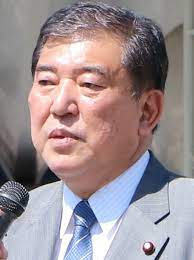Japan's New Leader Unveils Cabinet Ahead of Snap Election
Japan’s Prime Minister Shigeru Ishiba announced his new cabinet, aiming to mend party rifts and secure a national mandate in the upcoming October 27 snap election. Ishiba, who recently won the Liberal Democratic Party leadership, focuses on balanced U.S.-Japan relations and tackling internal and external security issues.

Japan's new Prime Minister Shigeru Ishiba on Tuesday unveiled his cabinet as he seeks to heal party divisions and secure a national mandate with an October 27 snap election.
The 67-year-old former defence minister, who last week won a close-fought contest to lead the ruling Liberal Democratic Party (LDP), was confirmed earlier in the day as prime minister by parliament. He is scheduled to hold his first press conference later today in Tokyo.
The Ishiba administration's approach to diplomacy with Japan's closest ally, the United States, will be under scrutiny, as he has repeatedly called for a more balanced relationship with Washington. He has also proposed creating an Asian version of the collective security group NATO to deter China—an idea that could provoke Beijing and has already been dismissed by a senior U.S. official as premature.
Ishiba faces multiple challenges, including rising living costs and a scandal-plagued party, alongside navigating a volatile security environment in East Asia marked by an assertive China and nuclear-armed North Korea. A party outsider who failed at four previous leadership bids, Ishiba has named a mixture of rivals and allies to his cabinet.
The cabinet includes two former leadership rivals in key positions: Katsunobu Kato as finance minister and Yoshimasa Hayashi as chief cabinet secretary. Kato’s appointment to the finance ministry is significant, given his experience in former premier Shinzo Abe's administration, known for its expansionary fiscal and monetary policies.
Following Ishiba's leadership win over Sanae Takaichi, the Nikkei stock index fell nearly 5% on Monday due to a surging yen but recovered on Tuesday. Close ally Takeshi Iwaya will become foreign minister, while Gen Nakatani returns to the defence ministry. Former junior minister Yoji Muto will oversee the economy, trade, and industry ministry.
In his victory speech, Ishiba stressed the importance of strengthening Japan’s security in light of recent territorial incursions by Chinese and Russian military vessels. Notably, five lawmakers who contested the leadership race have not been included in his government or given key party roles.
Among them is Takaichi, who declined a senior party position after Ishiba narrowly defeated her in the closest leadership election in seven decades. Yoshihiko Noda, leader of the main opposition Constitutional Democratic Party of Japan, announced plans to highlight LDP's scandals in the upcoming election. Despite these issues, the ruling party is expected to maintain power due to weak opposition.
A recent Mainichi newspaper poll showed that a third of respondents support the LDP, versus 15% for the main opposition. Over half of respondents, including opposition supporters, expressed optimism about Ishiba's appointment.
(With inputs from agencies.)
ALSO READ
Karnataka Cabinet to Address Kalyana Karnataka Region Development
Union Cabinet Clears Development of Next-Gen Launch Vehicle
JD(U) Welcomes Union Cabinet's Move on Simultaneous Elections
Union Cabinet's 'One Nation, One Election' Proposal Praised by Amit Shah
Union Cabinet Unveils Bio-RIDE Scheme to Boost Biotechnology










